The US cover of Freakonomics is a play on the old “comparing apples to oranges” phrase:
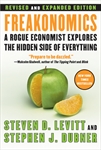
Well, it looks like comparing apples and oranges is a strange concept in many places. Check out the different analogies used on the cover (green egg yolks, banana corn, three headed scissors, etc.) from editions in foreign countries:
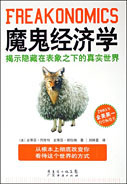
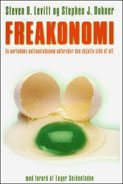
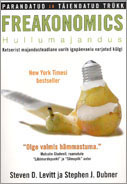
(L to R: Chinese, Denmark, Estonia)
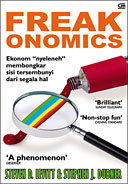
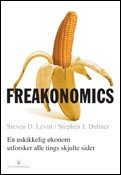
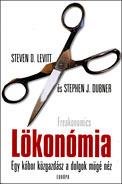
(L to R: Indonesia, Norway, Hungary)

Ryan Heneise
on 20 Oct 09What’s even more interesting are the countries where “apples-oranges” holds true: it translates translates in Germany, China, Greece, Russia, etc.
And then look at the contrasts between cultures: Apple/Orange works in China but not Japan, Finland but not Denmark, Greece but not Turkey.
And what the heck is up with the U.K. edition? And Slovenia? My goodness.
Ryan Heneise
on 20 Oct 09I got Japan and China backwards.
Eugene Bolshakov
on 20 Oct 09I’m not sure that the the “apple-orange” image on the cover necessarily means that the concept holds true in the country. In Russia we’d say “comparing flies and cutlets” (weird, I know).
It might actually illustrate the “hidden side of everything” part of the title. Like the orange is sort of “hidden” inside the apple.
Ole Begemann
on 20 Oct 09Here in Germany, we compare apples to pears, not to oranges.
dusoft
on 20 Oct 09In Slovakia, we compare apples to pears as well, although there won’t ever be any Freakonomics edition :-)
Anonymous Coward
on 20 Oct 09Same in Holland (apples to pears). I wonder if they gave it much thought.
Michael Moncur
on 20 Oct 09I’m not sure they intended the original cover to refer to comparing apples and oranges – it could just be a way to illustrate “the hidden side of everything” like Eugene said. Like the bizarre light-bulb-inside-a-pear image on the Estonian cover, or the Banana Corn on Norway’s.
I suspect the main issue is that the apples/oranges image is pretty subtle – you’d have to be a regular consumer of both apples and oranges to notice anything “freaky” about it.
What’s strange is the completely different message some of the covers send – Hungary’s three-handled scissors don’t show “the hidden side” of anything, just something completely broken. And Denmark’s green egg reminds me more of a rotten egg than Dr. Seuss.
And what the heck happened in France? And is that UK Paperback cover some kind of joke?
Ananymous Coward
on 20 Oct 09“And what the heck happened in France?”—Same what happens there all the time – it just neeeeeds to be different from what the English or American do.
The Turkish cover manages to inhabit its own universe of thinking, though…
Rahul
on 20 Oct 09I agree with Michael, I always thought the cover was a reference to the hidden side of everything rather than comparing apples to oranges. What about Freakonomics is even about that phrase?
Jaanus
on 20 Oct 09There is a straightforward explanation to the Estonian bizarre-bulb-and-pear:
In Estonian language, we use the same word, “pirn”, for both a light bulb and a pear. :)
Des
on 21 Oct 09Serbians compare ‘grandmothers and frogs’ and the Romanians compare ‘grandmother and machine guns’! Both extremely weird!
Stan Hansen - Brown Egg Marketing
on 21 Oct 09Me gusta “Lokonomia”
Christopher Fahey
on 23 Oct 09There’s a wonderful chart of how different cultures express incomprehensible languages (what English-speakers say “it’s all Greek to me”, but what do Greeks say? It’s surprising:
http://daisyjoe.wordpress.com/2009/02/27/greek-to-me-diagram/
enid
on 27 Oct 09well, not quite sure about what ‘comparing apples and oranges’ means in English, but I could make some explain here to the chinese simplified version cover, as it refers a saying in Chinese: A wolf wears a lamb suit. This saying means that those who seems innocent of the outside but evil in the inside.
thus I think I’ll agree with Rahul and Michael. it’s more about the hidden things.
This discussion is closed.